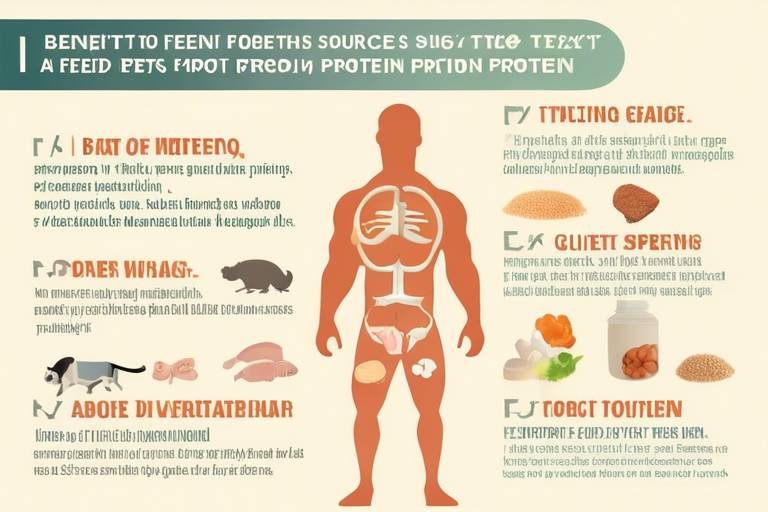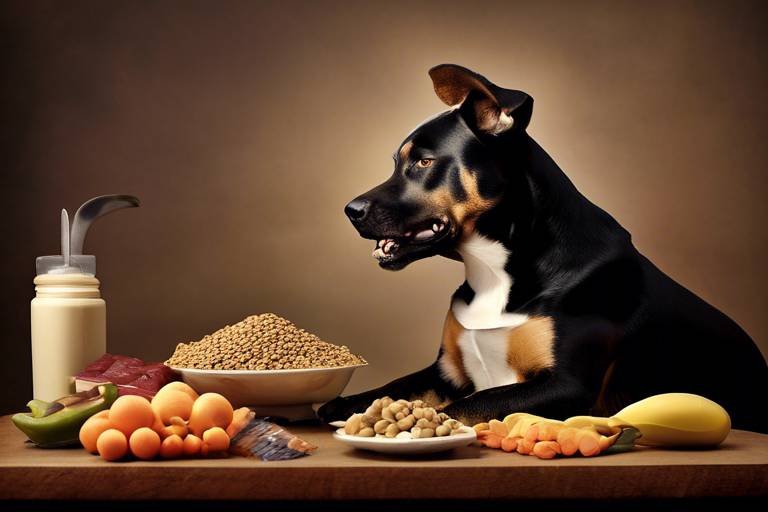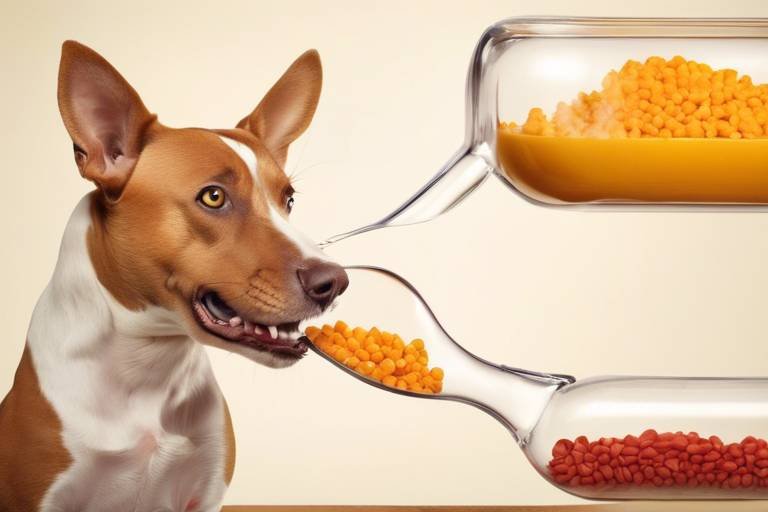The Impact of Diet on Pet Mood and Behavior
Have you ever noticed how your pet's mood can shift dramatically? One moment they're bouncing around with excitement, and the next, they seem down in the dumps. Well, believe it or not, what goes into their bowl plays a significant role in their emotional and behavioral well-being. Just like us, pets are deeply affected by their diet, and understanding this connection can empower you as a pet owner to make choices that promote not just physical health but also emotional stability.
Imagine your pet's mood as a delicate balance, much like a finely tuned instrument. If one string is too tight or too loose, the whole melody can sound off. Similarly, the nutrients in your pet's food can either harmonize with their mood or create dissonance. A well-rounded diet rich in essential nutrients can lead to a happier, more balanced pet, while a poor diet can contribute to anxiety, hyperactivity, or lethargy.
So, what exactly should you be looking for in your pet's food? The answer lies in understanding the fundamental role of nutrition in shaping your pet's behavior. Just as we need a variety of foods to stay healthy, pets also thrive on a diverse diet that meets their specific nutritional needs. This means not only providing high-quality proteins but also ensuring they get essential fatty acids, vitamins, and minerals. By focusing on these elements, you can help your furry friend maintain a stable mood and a joyful disposition.
In the following sections, we'll dive deeper into the specific nutrients that have a profound impact on your pet's mood and behavior, explore common nutritional deficiencies, and discuss how you can optimize your pet's diet for better emotional health. Get ready to unleash the secrets of pet nutrition and discover how you can make a positive difference in your pet's life!
Understanding the fundamental link between what pets eat and their behavior can help pet owners make informed dietary choices for improved emotional health. Think of nutrition as the foundation of a pet's emotional well-being. Just like a house needs a solid base to stand tall, your pet's mood relies on a balanced diet. When pets consume a diet lacking in essential nutrients, they may exhibit signs of irritability, anxiety, or even aggression. It's essential to recognize that their behavior is not just a reflection of their environment but also of what they're being fed.
For instance, consider how certain ingredients can affect a pet's energy levels. A diet high in processed foods and sugars can lead to erratic behavior, much like how we feel after indulging in too much candy. In contrast, a diet rich in whole foods and balanced nutrients can provide steady energy and promote a calm disposition. By understanding the role of nutrition, you can make choices that foster a happier, healthier pet.
Identifying key nutritional deficiencies that can lead to mood swings and behavioral issues in pets is crucial for ensuring their overall well-being and happiness. Just like humans can suffer from deficiencies that affect their mood—think of how a lack of vitamin D can lead to feelings of sadness—pets are no different. Some common deficiencies that pet owners should be aware of include:
- Omega-3 Fatty Acids: Essential for brain health and mood regulation.
- B Vitamins: Important for energy levels and stress management.
- Magnesium: Helps prevent anxiety and promotes relaxation.
By keeping an eye on these nutrients, you can help mitigate mood swings and behavioral issues, ensuring your pet remains a joyful companion.
Omega fatty acids play a critical role in brain health and mood regulation, making them essential for a balanced diet in pets. These healthy fats are like the oil that keeps the engine running smoothly. Without them, your pet's mood can become as unpredictable as a rollercoaster ride. Omega-3s, in particular, have been shown to reduce anxiety and improve cognitive function, making them a vital addition to your pet's diet.
Exploring various dietary sources of omega fatty acids can help pet owners enrich their pet's diet and support emotional stability. Some excellent sources include:
- Fish oil (salmon, sardines)
- Flaxseed oil
- Chia seeds
Incorporating these foods into your pet's meals can significantly enhance their mood and overall well-being.
For pets lacking omega fatty acids in their diet, supplementation can be a viable option to enhance mood and behavior. There are numerous omega-3 supplements available specifically for pets, which can be an easy way to ensure they're getting enough of these essential fats. Just remember to consult with your veterinarian before starting any new supplement regimen.
Certain vitamins and minerals are vital for maintaining mental health in pets, influencing their mood and behavior significantly. Nutrients like B vitamins, magnesium, and vitamin E can help regulate mood and reduce anxiety levels. A well-balanced diet that includes these nutrients can lead to a happier, more relaxed pet.
Examining how specific dietary components can contribute to hyperactivity in pets helps owners understand the importance of balanced nutrition for calmer behavior. Just as sugary snacks can send kids bouncing off the walls, certain ingredients can lead to hyperactivity in pets. A diet high in sugar or artificial additives can result in erratic behavior and mood swings.
High sugar intake in pets can lead to energy spikes and crashes, affecting their mood and behavior throughout the day. Instead of being a steady companion, your pet might feel like a ticking time bomb, ready to explode into a frenzy of activity. Reducing sugar and focusing on whole-food options can help stabilize their mood and energy levels.
Understanding the effects of caffeine and other harmful substances in pet diets is essential to prevent negative behavioral outcomes. Just like caffeine can make us jittery and anxious, it can have similar effects on pets. Avoid giving your furry friend any foods or drinks containing caffeine, as they can lead to severe behavioral issues and health problems.
Q: Can diet really affect my pet's behavior?
A: Absolutely! What your pet eats has a direct impact on their mood and behavior. A balanced diet rich in essential nutrients can promote emotional stability.
Q: What are the signs of nutritional deficiencies in pets?
A: Look for changes in behavior, energy levels, and overall health. Symptoms can include lethargy, anxiety, and irritability.
Q: Should I consider supplements for my pet?
A: If your pet's diet lacks certain nutrients, supplements can be beneficial. Always consult your veterinarian before starting any new supplements.

The Role of Nutrition in Pet Behavior
When we think about our furry friends, we often focus on their physical health, but what about their emotional well-being? The truth is, nutrition plays a pivotal role in shaping not only the physical state of our pets but also their mood and behavior. Just like humans, pets are affected by what they consume. Imagine feeding your dog a diet full of junk food; it’s no surprise if they become hyperactive or moody, right? It’s essential to recognize that a balanced diet can lead to a more stable and happy pet.
Research has shown that certain nutrients can influence brain chemistry and, subsequently, behavior. For instance, proteins are crucial as they provide the amino acids necessary for neurotransmitter production, which is vital for mood regulation. A diet lacking in these essential nutrients can lead to irritability, anxiety, and even aggression in pets. Consider this: if you were living on a diet of only sugary snacks, your mood would likely swing like a pendulum, and the same goes for our pets.
Moreover, the impact of carbohydrates cannot be overlooked. While they provide energy, an excess can lead to spikes in blood sugar levels, resulting in hyperactivity followed by a crash that leaves your pet lethargic and irritable. This rollercoaster of energy can create a cycle of behavioral issues that can be frustrating for both the pet and the owner. So, the next time you're at the pet store, remember that the right balance of nutrients can make a world of difference.
In addition to proteins and carbohydrates, fats are also essential. Healthy fats, particularly omega fatty acids, are known for their anti-inflammatory properties and their role in brain health. They help maintain cognitive function and emotional stability. A pet’s diet rich in omega-3 and omega-6 fatty acids can lead to improved mood and behavior, making them more relaxed and less prone to anxiety. It’s like giving them a little boost of happiness with every meal!
It’s also important to consider the psychological aspect of feeding. Pets thrive on routine, and a consistent feeding schedule can provide a sense of security. When they know when to expect their meals, it can reduce anxiety and promote a calm demeanor. Think of it as a comforting ritual that reassures them they are loved and cared for.
Ultimately, understanding the role of nutrition in pet behavior is crucial for every pet owner. By making informed dietary choices, you can significantly improve your pet's emotional health, leading to a happier, more balanced companion. So, the next time you’re contemplating what to feed your pet, remember that their mood and behavior might just depend on it!
- What are the signs that my pet's diet is affecting their behavior? Look for changes in energy levels, increased irritability, or unusual aggression.
- Can a poor diet lead to anxiety in pets? Yes, deficiencies in certain nutrients can lead to anxiety and stress in pets.
- How can I ensure my pet is getting a balanced diet? Consult with your veterinarian to create a diet plan that meets all your pet's nutritional needs.
- Are there specific foods that can help calm my pet? Foods rich in omega fatty acids, like fish, can promote calmness and emotional stability.

When it comes to our beloved pets, their nutrition plays a pivotal role in shaping not only their physical health but also their emotional and behavioral well-being. Just like us, pets can experience mood swings and behavioral issues when their diets lack essential nutrients. It's crucial for pet owners to recognize the signs of nutritional deficiencies, which can manifest in various ways, from lethargy to aggression. By being aware of these deficiencies, you can make informed choices that promote a happier, healthier pet.
One of the most common issues pet owners face is the lack of essential vitamins and minerals. For instance, a deficiency in B vitamins, particularly B6 and B12, can lead to irritability and anxiety in dogs and cats alike. Similarly, magnesium is often overlooked, yet it plays a significant role in calming the nervous system. Without it, pets may become restless and exhibit signs of stress. Moreover, vitamin D is not just important for bone health; it also impacts mood regulation. A well-rounded diet that includes these vital nutrients can significantly enhance your pet's emotional stability.
Another critical area to consider is protein intake. Pets require high-quality protein to maintain their energy levels and overall mood. Insufficient protein can lead to feelings of fatigue and can even affect their ability to concentrate. This is particularly important for active breeds that need more energy to fuel their playful antics. A diet rich in animal-based proteins can help keep your pet’s energy levels steady, which in turn supports a balanced mood.
Furthermore, the absence of omega fatty acids can lead to significant behavioral problems. These essential fats are crucial for brain health and can influence mood regulation. Pets lacking in omega-3 and omega-6 fatty acids may show signs of aggression or anxiety. In fact, studies have shown that these fatty acids can have a calming effect on pets, making them less reactive to stressors in their environment. This is why incorporating sources of omega fatty acids into your pet's diet is not just a recommendation; it’s a necessity.
To summarize, here are some common nutritional deficiencies to watch out for:
- B Vitamins: Essential for energy and mood stability.
- Magnesium: Supports a calm nervous system.
- Vitamin D: Vital for mood regulation.
- High-quality Protein: Fuels energy and concentration.
- Omega Fatty Acids: Critical for brain health and emotional balance.
By ensuring your pet receives a balanced diet rich in these nutrients, you'll not only enhance their physical health but also pave the way for a more stable and joyful emotional state. Remember, a happy pet often translates to a happy owner, so investing in their nutrition is a win-win!
Q: How can I tell if my pet is suffering from nutritional deficiencies?
A: Look for signs such as changes in behavior, lethargy, or unusual aggression. Regular vet check-ups can also help identify deficiencies.
Q: What are the best sources of omega fatty acids for pets?
A: Fish oil, flaxseed oil, and certain types of fish such as salmon are excellent sources of omega fatty acids.
Q: Can I supplement my pet's diet with vitamins?
A: Yes, but it’s essential to consult with your veterinarian before introducing any supplements to ensure they are safe and appropriate for your pet’s specific needs.
When we talk about keeping our furry friends happy and healthy, one of the unsung heroes in their diet is omega fatty acids. These essential nutrients are not just a buzzword in the pet nutrition world; they play a pivotal role in maintaining brain health and regulating mood. Imagine omega fatty acids as the oil that keeps the engine of your pet's brain running smoothly. Without them, the engine can sputter, leading to potential behavioral issues and emotional instability.
Omega fatty acids, particularly omega-3 and omega-6, are crucial for the formation of cell membranes in the brain. They help in neurotransmitter function, which is vital for communication between brain cells. This is particularly important for pets dealing with anxiety or stress. Just like we need a balanced diet to feel our best, pets require these fatty acids to maintain their mental health and emotional well-being.
Research has shown that pets with a diet rich in omega fatty acids tend to exhibit more stable moods and less aggressive behavior. For instance, a study found that dogs supplemented with omega-3 fatty acids showed a marked decrease in signs of anxiety and aggression. It’s almost like giving them a little mood booster! So, if you notice your pet acting a bit off, it might just be their diet lacking these vital nutrients.
But how do we ensure our pets are getting enough omega fatty acids? Here are a few key points to consider:
- Look for pet foods that specifically mention omega fatty acids on the label.
- Consider incorporating fish oil or flaxseed oil into their meals.
- Consult with your veterinarian about the right dosage for your pet's specific needs.
In summary, omega fatty acids are not just another dietary supplement; they are a crucial component in keeping your pet's mind sharp and their mood stable. By prioritizing these nutrients in your pet’s diet, you’re not only enhancing their physical health but also their emotional happiness. After all, a happy pet means a happy home!
When it comes to ensuring our furry friends have a balanced diet, omega fatty acids are often the unsung heroes. These essential fats are crucial for maintaining not just physical health but also emotional well-being. So, where can pet owners find these vital nutrients? Let's dive into some of the best sources of omega fatty acids that can easily be incorporated into your pet's diet.
First off, fish oil is a powerhouse of omega-3 fatty acids. Rich in EPA and DHA, fish oil can significantly contribute to brain health and mood regulation. Whether you opt for salmon, sardines, or mackerel, these fish are not only tasty but also packed with the nutrients your pet needs. Just a few drops of high-quality fish oil added to your pet's food can make a world of difference.
Next up, we have flaxseed oil. This plant-based source is an excellent alternative for pets that may have allergies to fish. Flaxseed oil is rich in alpha-linolenic acid (ALA), another type of omega-3 fatty acid. Sprinkling flaxseed meal or oil onto your pet's meals can help boost their omega intake without breaking the bank.
Another fantastic source is hemp oil. This oil is not only rich in omega fatty acids but also contains a balanced ratio of omega-6 to omega-3, which is essential for maintaining overall health. Just like flaxseed oil, hemp oil can be easily mixed into your pet's food, providing a nutritious boost that supports their mood and behavior.
For those who prefer whole food sources, chia seeds are a great option. These tiny seeds are loaded with omega-3 fatty acids and can be sprinkled onto your pet's food or mixed into homemade treats. Not only do they enhance nutritional value, but they also add a fun texture that pets often enjoy.
Lastly, walnuts are another excellent source of omega-3 fatty acids, though they should be given in moderation. Chopped walnuts can be a special treat that adds variety to your pet's diet while providing those essential fats that play a crucial role in mood regulation.
In summary, incorporating omega fatty acids into your pet's diet can significantly impact their emotional health and behavior. Whether through fish oil, flaxseed oil, hemp oil, chia seeds, or walnuts, there are numerous options available to ensure your pet thrives both mentally and physically. Remember, a happy pet is a well-fed pet!
- How do I know if my pet is getting enough omega fatty acids? If your pet shows signs of mood swings, anxiety, or behavioral issues, it might be time to evaluate their diet for omega fatty acids.
- Can I give my pet human supplements? It's best to consult your veterinarian before giving your pet any human supplements, as dosages and ingredients can vary significantly.
- Are there any side effects to omega fatty acid supplementation? While generally safe, too much omega fatty acid can lead to digestive upset. Always follow recommended dosages.
When it comes to enhancing your pet's mood and behavior, supplementation can be a game changer, especially if their diet lacks essential nutrients like omega fatty acids. Think of it as giving your furry friend a little extra boost, much like how we might take vitamins to fill in the gaps in our diets. It's important to understand that while a balanced diet is crucial, sometimes our pets need that extra support to thrive emotionally and behaviorally.
One of the most popular forms of supplementation for pets is fish oil, which is rich in omega-3 fatty acids. These fatty acids are known to support brain health and can help mitigate issues like anxiety and depression in pets. If your pet is a picky eater or has specific dietary restrictions, you might want to consider liquid fish oil supplements that can easily be added to their meals. Alternatively, there are also capsules available that can be given directly or sprinkled onto food.
Another option is flaxseed oil, which is a plant-based source of omega-3 fatty acids. For pet owners looking for vegetarian options, flaxseed oil can be a great alternative. However, it’s essential to note that while flaxseed oil contains omega-3s, it doesn’t provide the same type of omega-3s found in fish oil, which are more readily utilized by the body. Therefore, if you opt for flaxseed oil, consider pairing it with other supplements to ensure a well-rounded approach.
Moreover, hemp oil has gained popularity in recent years for its potential benefits in promoting calmness and reducing anxiety. It contains a balance of omega-3 and omega-6 fatty acids, which can help improve overall mood stability in pets. Just be sure to choose high-quality, organic hemp oil to maximize its benefits.
It's also important to consult with your veterinarian before starting any supplementation regimen. They can provide tailored advice based on your pet's specific needs, health conditions, and dietary restrictions. Keep in mind that while supplements can be beneficial, they should not replace a balanced diet but rather complement it. Think of them as the cherry on top of a well-rounded meal plan!
In conclusion, supplementation can play a vital role in enhancing your pet's emotional well-being and behavior. By considering options like fish oil, flaxseed oil, and hemp oil, you can help support your furry friend’s mood stability and overall health. Just remember to keep the conversation open with your vet to ensure your pet is getting the best possible care.
- What are the signs that my pet may need supplementation? If you notice changes in your pet's behavior, such as increased anxiety, mood swings, or hyperactivity, it may be worth exploring supplementation options.
- Can I give my pet human supplements? It's not advisable to give human supplements to pets without consulting a veterinarian, as dosages and ingredients can vary significantly.
- How long does it take to see results from supplementation? Depending on the specific supplement and the pet's needs, it can take a few weeks to notice improvements in mood and behavior.
- Are there any side effects to pet supplements? While most supplements are safe, some pets may experience gastrointestinal upset or allergic reactions. Always monitor your pet after introducing a new supplement.
When it comes to our beloved pets, their mental health is just as important as their physical well-being. Did you know that certain vitamins and minerals play a pivotal role in maintaining their mood stability and overall behavior? Just like humans, pets require a balanced intake of essential nutrients to thrive emotionally. For instance, the B vitamins, particularly B6 and B12, are crucial for the production of neurotransmitters that regulate mood. A deficiency in these vitamins can lead to irritability and anxiety in pets, making them more prone to behavioral issues.
Moreover, minerals such as magnesium and zinc are vital for brain function and emotional regulation. Magnesium, often referred to as the "relaxation mineral," helps calm the nervous system, while zinc is essential for cognitive function. A lack of these minerals can lead to heightened stress levels and even aggression in some pets. Therefore, ensuring your furry friend receives adequate amounts of these nutrients is critical for their mental health.
To illustrate the importance of vitamins and minerals, consider the following table that highlights key nutrients and their benefits for pet mental health:
| Nutrient | Benefits |
|---|---|
| B Vitamins | Support neurotransmitter production, regulate mood |
| Magnesium | Calms the nervous system, reduces anxiety |
| Zinc | Enhances cognitive function, supports emotional stability |
Incorporating these vitamins and minerals into your pet's diet can be done through a combination of high-quality pet foods and natural supplements. Foods rich in these nutrients include leafy greens, fish, and lean meats. However, always consult with your veterinarian before introducing any new supplements or dietary changes. They can provide personalized recommendations based on your pet's specific needs, ensuring they receive a well-rounded diet that promotes both physical and mental health.
In summary, just as we prioritize our own mental health, we must also pay attention to the nutritional needs of our pets. A balanced diet enriched with essential vitamins and minerals can make a world of difference in their mood and behavior, leading to a happier and healthier life. So, the next time you’re shopping for pet food, remember that what you feed your furry friend can greatly impact their emotional well-being.

When it comes to our beloved pets, understanding the connection between diet and behavior is crucial, especially regarding hyperactivity. Just like humans, pets can experience fluctuations in their energy levels and moods based on what they consume. Imagine feeding your furry friend a diet high in sugar and processed ingredients; it’s like giving a child a candy bar before bedtime – you can expect a wild burst of energy followed by a crash. This cycle can lead to hyperactive behaviors that leave pet owners feeling overwhelmed and confused.
One of the primary culprits behind hyperactivity in pets is the intake of sugar. When pets consume sugary treats or foods, their bodies respond with a rapid increase in energy, which can be fun for a moment but often leads to a significant drop in blood sugar levels shortly after. This drop can cause irritability, restlessness, and even anxiety. To illustrate this point, consider the following table that outlines the effects of sugar on pet behavior:
| Sugar Intake | Immediate Effect | Short-term Effect | Long-term Effect |
|---|---|---|---|
| High | Increased Energy | Hyperactivity | Behavioral Issues |
| Moderate | Stable Energy | Normal Activity Levels | Balanced Mood |
| Low | Steady Energy | Calm Behavior | Improved Focus |
Furthermore, it’s essential to consider other harmful substances that can inadvertently find their way into pet diets. For instance, caffeine is a well-known stimulant that can significantly impact a pet's behavior. Even small amounts can lead to hyperactivity, increased heart rate, and restlessness. It’s critical to keep caffeinated products out of reach and to educate ourselves on what foods are safe for our pets. Other substances, such as artificial additives and preservatives, can also trigger hyperactive responses in some pets. These ingredients can disrupt the natural balance of their diets and lead to behavioral issues.
To help combat hyperactivity, pet owners should focus on providing a balanced diet rich in whole foods. Incorporating ingredients that promote stable energy levels can make a world of difference. Here are some dietary suggestions to consider:
- Whole Grains: Foods like brown rice and oats can provide sustained energy without the spikes associated with sugar.
- High-Quality Proteins: Lean meats, fish, and legumes support muscle health and can keep pets feeling full and satisfied.
- Fruits and Vegetables: Fresh produce can offer essential vitamins and minerals that contribute to overall well-being.
In conclusion, understanding the relationship between diet and hyperactivity in pets is vital for fostering a calm and stable environment. By making informed dietary choices and avoiding high-sugar and harmful substances, pet owners can help their furry companions maintain a balanced mood and behavior. Remember, a happy pet often starts with a healthy plate!
Q: Can diet really affect my pet's behavior?
A: Absolutely! What your pet eats plays a significant role in their mood and behavior. A balanced diet can help stabilize energy levels and improve overall well-being.
Q: What should I avoid feeding my hyperactive pet?
A: It's best to steer clear of high-sugar foods, caffeine, and artificial additives. Focus on whole foods that provide balanced nutrition.
Q: How can I tell if my pet's diet is affecting their behavior?
A: If you notice sudden bursts of energy followed by crashes or behavioral changes, it may be time to reevaluate their diet.
When it comes to our furry friends, it’s easy to think that a little sweetness won’t hurt. After all, who doesn’t love the occasional treat? However, the reality is that high sugar intake in pets can lead to a rollercoaster of energy spikes and crashes, which can significantly affect their mood and behavior throughout the day. Imagine how you feel after consuming a sugary snack; you might experience a burst of energy followed by a sudden crash. Pets experience similar fluctuations, which can leave them feeling anxious, irritable, or hyperactive.
One of the main issues with sugar in pet diets is that it can disrupt the balance of energy levels. When pets consume sugary foods, their bodies quickly convert the sugar into glucose, leading to a rapid increase in energy. This sudden surge can result in hyperactivity, making your pet feel like they’re on a never-ending treadmill of excitement. But just as quickly as that energy rises, it can plummet, leaving them lethargic and moody. This cycle can create a frustrating experience for both pets and their owners, as you might find your once-playful pup turning into a couch potato within a few hours.
Moreover, excessive sugar can lead to long-term health issues, such as obesity and diabetes, which can further exacerbate behavioral problems. Pets that are overweight may become less active and more prone to mood swings due to discomfort. It's crucial to be mindful of the ingredients in your pet's food and treats. Many commercial pet foods are loaded with sugars and artificial sweeteners that contribute to these issues. A quick glance at the ingredient list can often reveal hidden sugars under various names, such as corn syrup, cane sugar, or even honey.
So, what can pet owners do to ensure their furry companions maintain a balanced diet? Here are a few tips:
- Choose high-quality pet foods that prioritize protein and whole ingredients over fillers and sugars.
- Limit the number of treats you give your pet, and opt for healthier options like fruits and vegetables that are low in sugar.
- Be cautious with human food scraps, as many can be high in sugar and unhealthy for pets.
In summary, the role of sugar in pet diets is not to be taken lightly. Just as we strive for a balanced diet to maintain our own health, our pets deserve the same consideration. By keeping their sugar intake in check, we can help ensure they lead happier, healthier lives, free from the mood swings and behavioral issues that come with excessive sugar consumption.
Q: Can sugar cause behavioral issues in pets?
A: Yes, high sugar intake can lead to energy spikes and crashes, which may result in hyperactivity or irritability in pets.
Q: What are some healthier treat options for pets?
A: Consider fruits like blueberries or vegetables like carrots, which are low in sugar and provide essential nutrients.
Q: How can I tell if my pet's food contains too much sugar?
A: Check the ingredient list for added sugars or sweeteners, and look for high-quality foods that emphasize protein and whole ingredients.
When it comes to our furry companions, it's easy to overlook the potential dangers lurking in their diet. One of the most concerning substances is caffeine. While we might enjoy our morning coffee or afternoon pick-me-up, these caffeinated delights can spell trouble for pets. Just a small amount of caffeine can lead to serious health issues in animals, including increased heart rate, restlessness, and even seizures. Imagine how jittery and anxious you feel after too much coffee; now, picture your pet experiencing that same turmoil but without the ability to communicate their discomfort.
But caffeine isn't the only harmful substance that can sneak into a pet's diet. There are several other items that, while harmless to humans, can wreak havoc on our pets' well-being. For example, chocolate contains theobromine, which is toxic to dogs and can lead to vomiting, diarrhea, and even fatal heart complications. Similarly, grapes and raisins are known for causing kidney failure in dogs, and onions and garlic can damage red blood cells, leading to anemia. It's crucial for pet owners to be aware of these everyday foods that can have dangerous effects on their beloved animals.
To help visualize the dangers of these substances, here's a table outlining some common harmful items and their effects:
| Harmful Substance | Potential Effects on Pets |
|---|---|
| Caffeine | Increased heart rate, restlessness, seizures |
| Chocolate | Vomiting, diarrhea, heart complications |
| Grapes/Raisins | Kidney failure |
| Onions/Garlic | Anemia, damage to red blood cells |
As responsible pet owners, it’s our duty to ensure that our pets are not exposed to these harmful substances. Always check labels on pet food and treats, and be cautious about what you leave within reach. Remember, just because something is safe for us doesn’t mean it’s safe for them. If you suspect your pet has ingested any of these harmful substances, it’s vital to consult with your veterinarian immediately. Early intervention can make a significant difference in the outcome.
So, the next time you’re enjoying a snack or a drink, take a moment to consider your pet’s safety. Keeping their diet free from harmful substances not only protects their physical health but also contributes to their overall emotional well-being. After all, a happy pet is a healthy pet!
- What should I do if my pet ingests caffeine? - Contact your veterinarian immediately for advice on how to proceed.
- Are there any safe alternatives to caffeinated products for pets? - Yes, there are many pet-safe treats and beverages available that do not contain harmful substances.
- How can I ensure my pet's diet is safe? - Always read labels, avoid giving human food without checking its safety, and consult your vet for dietary recommendations.
Frequently Asked Questions
- How does diet influence my pet's mood and behavior?
Just like humans, pets are affected by what they eat. A balanced diet rich in essential nutrients can lead to better emotional stability and behavior. For instance, pets lacking in omega fatty acids may show signs of anxiety or aggression. So, if you want a happy pet, consider their nutritional intake!
- What are some common nutritional deficiencies that affect pets?
Many pets suffer from nutritional deficiencies that can lead to mood swings and behavioral issues. Common deficiencies include a lack of omega fatty acids, vitamins like B12, and minerals such as magnesium. Recognizing these deficiencies is crucial to ensuring your furry friend is happy and healthy.
- Why are omega fatty acids important for my pet?
Omega fatty acids are like the superheroes of pet nutrition! They play a vital role in brain health and mood regulation. If your pet's diet is lacking in these essential fats, you might notice changes in their behavior, such as increased irritability or anxiety.
- What are some good sources of omega fatty acids for pets?
Great sources of omega fatty acids for pets include fish oil, flaxseed oil, and certain types of fish like salmon. Incorporating these into your pet's diet can help promote emotional stability and overall well-being.
- Can I supplement my pet's diet with omega fatty acids?
Absolutely! If your pet's diet is lacking in omega fatty acids, supplementation can be a great option. Just make sure to consult with your veterinarian to find the right dosage and product for your furry friend.
- What vitamins and minerals should I focus on for my pet's mental health?
Key vitamins and minerals like B vitamins, magnesium, and zinc are essential for maintaining your pet's mental health. These nutrients can significantly influence their mood and behavior, so a balanced diet is crucial!
- How can diet contribute to hyperactivity in pets?
Diet plays a huge role in your pet's energy levels. Certain dietary components, like high sugar content, can lead to energy spikes followed by crashes, resulting in hyperactivity. A balanced diet can help keep your pet calm and focused.
- What effects does sugar have on my pet's behavior?
High sugar intake can lead to mood swings in pets, similar to what we experience. Energy spikes followed by crashes can make pets feel restless and anxious. Reducing sugar in their diet can help maintain a more stable mood.
- Are there harmful substances I should avoid in my pet's diet?
Yes! Caffeine and certain artificial additives can be detrimental to your pet's health and behavior. It's essential to read labels and avoid foods that contain these harmful substances to prevent negative behavioral outcomes.



















